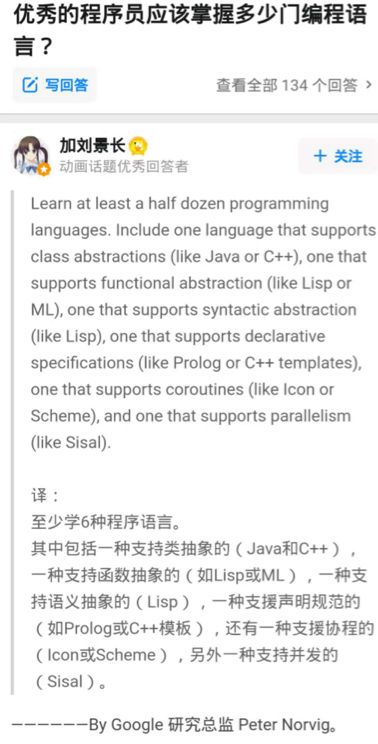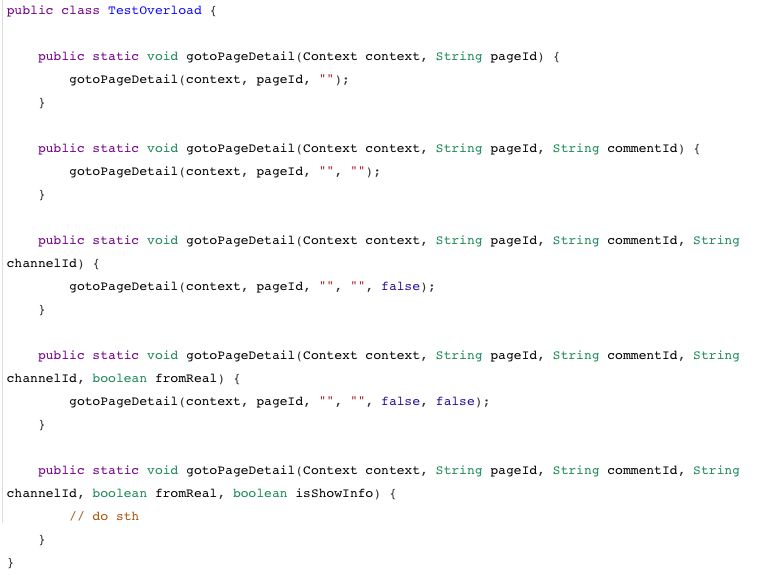每天三分钟了解 Kotlin 的秘密: 基础入门 (1) | 开发者说·DTalk
本文作者: 李良逸,
原文发布于简书: https://www.jianshu.com/p/e09d3c9c40ef
为什么要学习 Kotlin
首先,看这篇文章前,应该先明确一个问题: 我们为什么要学习 Kotlin?
如下图所示:
而 Kotlin 是一门非常优秀的语言,兼容了 N 多种语言的优点,学习 Kotlin 有助于提升我们多层编程开发的认识。
从一个类开始
感谢开源项目 https://github.com/githubwing/GankClient-Kotlin 以及 https://github.com/huanglizhuo/kotlin-in-chinese 的 Kotlin 翻译
我们从 GankClient 的某个类开始学习 Kotlin
这是 Kotlin 的一个样例类 (终于不用再像 java 一样写多余的分号了):
package com.wingsofts.gankclient.mvp.modelimport com.wingsofts.gankclient.api.GankApiimport com.wingsofts.gankclient.bean.FuckGoodsimport com.wingsofts.gankclient.bean.JsonResultimport com.wingsofts.gankclient.mvp.contract.RandomContractimport rx.Observableimport javax.inject.Injectclass RandomModelconstructor(private val api: GankApi) : RandomContract.Model {override fun getRandom(type: String): Observable<JsonResult<List<FuckGoods>>> {return api.getRandom(type)}var counter = 0set(value) {if (value >= 0)field = value}fun max(a: Int, b: Int) = if (a > b) a else b}
导包
与 Java 一样,Kotlin 也含有默认导入的特性。Kotlin 的每个文件都默认导入了如下常用包:
-- kotlin.*-- kotlin.annotation.*-- kotlin.collections.*-- kotlin.comparisons.* (since 1.1)-- kotlin.io.*-- kotlin.ranges.*-- kotlin.sequences.*-- kotlin.text.*
而 Kotlin 的导包方式和 Java 也类似,但有一点,Kotlin 不支持静态导入。
Kotlin 为什么不支持静态导入?
因为静态导入会增加代码的阅读成本。
函数声明
fun
Kotlin 中用关键字 fun 声明函数。
override fun getRandom(type: String): Observable<JsonResult<List<FuckGoods>>> {return api.getRandom(type)}
Kotlin 为什么使用 fun 来声明函数?为什么不是 function? 或者 def?
JetBrains 团队说: "We use 'fun' because we like it - and yes, we do know what the word means in English."
我们使用 "fun" 因为我们喜欢它,而且我们知道这个词在英语中是啥意思!
"fun" 在英语中是什么意思?
来自谷歌翻译的 fun 的翻译: 动词 开玩笑,名词 玩笑。
参数
参数声明
Kotlin 的参数使用 Pascal 符号定义,参数之间和 java 类似通过 " , " 分隔,参数需要指明类型。
fun test(count: Int, test2: Int) {}
为什么 Kotlin 像 Pascal 一样,参数声明类型要在参数名后面?count: Int
Rob Pike 曾解释过这个问题: 因为这样更加清晰易懂,当然,我觉得这样存在很大的争议,不过也和工程师自身的习惯有关系。
默认参数
Kotlin 参数可以设置默认值,当需要忽略该参数的时候可以使用参数的默认值。Like this: off: Int = 0
fun read(b: Array<Byte>, off: Int = 0, len: Int = b.size ) {...}
Kotlin 参数为什么支持默认值?
你听说过重载爆炸吗?🌰
空返回值
在 Java 中返回空关键字为 void,在 Kotlin 中的空返回值为 Unit,并且可以省略 .Unit 和 void 不同,Unit 是个真实的类并且是个单例。
// 不省略fun printHello(name: String?): Unit {...}// 省略fun printHello(name: String?) {...}
为什么使用Unit?
"Unit" just stands for "something that has only one value", it’s a traditional name, comes from functional languages. I agree that this name is not very intuitive, but we failed to invent a better name.
"Unit" 代表 "只有一个值",它是一个来自函数式语言的传统的名称。我同意这个名字不是很直观,但我们没有想到一个更好的名字。
局部变量
Kotlin 局部变量分为 val 和 var
var 关键字声明可变属性,和 Java 变量声明类似;
val 关键字声明只读属性,和 Java 中 final 变量类似,在初始化时需要赋值,以后不能改变。更多的应该使用 val 关键字。
val a: Int = 1var x = 5
为什么使用 val 关键字?
val 具有 Immutable 或 readonly 的特性,一旦创建,不可改变。没有竞争条件,没有并发问题,无需去同步,保证了线程安全,不需要担心空安全问题。
为什么是 val 和 var?
因为 val 是 value 的缩写,而 var 是 variable。
"Using vals in your code makes you think about alternative, immutable, functional code. […] Removing vars leads to refactoring. The refactoring leads to new coding patterns. New coding patterns leads to a shift in your approach to programming. This shift in approach leads to transformative code that has fewer defects and is easier to maintain. "
— Beginning Scala, David Pollack
"开发者说·DTalk" 面向中国开发者们征集 Google 









